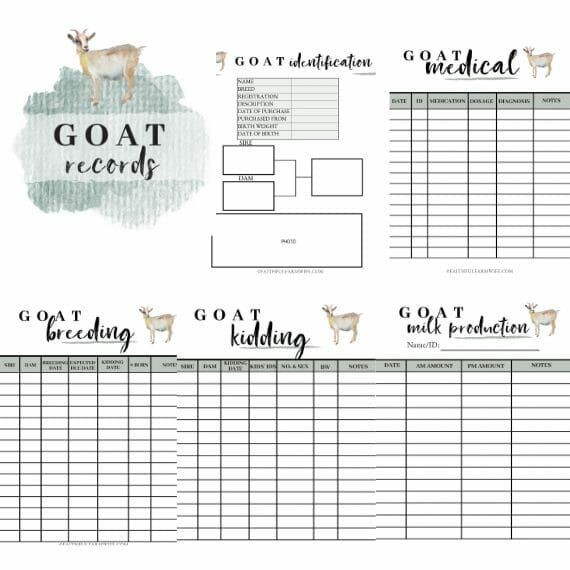IMPORTANCE OF RECORDS IN GOAT FARM
Karishma Choudhary and Vinod Kumar Palsaniya
M.V.Sc. Scholar, LPM Department
CVAS, Navania, Vallabhnagar, Udaipur
Abstract
Record keeping is a necessary element of good livestock business management. With no written records, farmers have to depend on their memory while making decisions regarding their farm practices. If farmers have proper records in their farm, they can smartly manage their farm in compared to other farmers. Proper records are helpful in provide information regarding pedigree, production, feed consumption, rate of kidding, weight gain, dressing percentage and finances. They can also see the strengths and weaknesses in their farm operations.
Key words
Records importance, types of records, advantages, constraints.
Introduction
Goat rearing is one of the major contributors to the animal husbandry sector of our country. Goat farming is an extremely profitable and sustainable business due to goats are hardy in nature, adopt to various climatic conditions. Goats are prolific breeders, and their gestation period lasts for only five months. Goats are reared for milk, meat as well as fiber. In the bustling world of agriculture, where each decision can impact the success of a farm, one often overlooked aspect plays a pivotal role in ensuring prosperity – record-keeping. When it comes to goat farming, the meticulous documentation of data holds the key to unlocking efficiency, profitability, and sustainable growth. In this article, we delve into the often-underestimated realm of record-keeping on goat farms and shed light on why it is the unseen backbone of success.
Outputs from Goats–
India is the world’s largest producer of goat milk and third-largest producer of goat meat. According to 20th livestock census (DAHDF, 2019) Goat population in India is 148.88 million, increased by 10.1 % over the previous census. About 27.8% of the total livestock is contributed by goats. Goat milk contributes 3.3 % of total milk production of India in 2022-23. Goat meat contributes 14.47 % of total meat production in our country (Basic Animal Husbandry Statistics, 2022-23)
These all data maintain in records by farmers and other organized goat farm.
Importance of Records–
- A record is an accounting of events or data. Actually, records do very little except to remind one of an event.
- Records must be processed or summarized in order to provide information.
- Good records are needed to serve as the basis for sound management decisions.
- The farmer must have records for evaluation, planning, coordination and execution of farm activities.
- Recording can be done most easily if animals have some form of identification. Thus, animals recording and identification are inseparable.
- Good farm records should contain information of essential parameters, must be easy and simple to understand and should have systematically arranged continuous information.
Types of records
Records can be maintained in many ways. Following kinds of records can be maintained at s goat farm-
- History card and pedigree records.
- Reproduction and Production records– provide details of individual ewe or doe performance like fertility, prolificacy, rearing and mothering ability and milk production estimated through kid growth rate to a given age.
- Feed consumption records– it is difficult to estimate due to grazing behavior, but some farm recorded the amount of concentrate for estimate profitability.
- Kidding record/ register– include identify, dam ID, weight, date of birth, type of birth and sex.
- Growth or weight records – periodically kept by recording the body weight of animals.
- Herd health records – including morbidity, mortality, signs and symptoms, diagnosis, treatments and vaccination.
- Mating records– sire, dam and progeny identification is important in breeding, sale and culling decisions.
- Identification records.
- Dressing percentage records – this information could be obtained from slaughter house/ abattoirs.
- Financial records (entire farm and enterprise) – cost-benefit analysis.
Advantage of Goat Farm Records–
- Assist in farm planning and farm business analysis.
- Provide data to researcher for research purpose.
- Used for evaluation of performance.
- Help in improve the production/income of farm.
- Provide data to extension workers for giving feedback information from farmers to scientist.
- Provides data to policy makers for future planning.
- Provides data to breeder for selection and breeding programme.
- Helps in reducing the cost of production.
- To adapt easily to government policies- rules for price fixation, getting subsidies etc.
- To know about productivity of farm in short duration of time.
Constraints in Farm Records in India-
There are many reasons due to which Indian dairy farmers don’t maintain farm record.
- Low level of literacy of farmers.
- Farmers plays role of owner, manager and laborers.
- Fear of taxation.
- Non-availability of farm record book, lack of knowledge of record keeping.
- Small herd size.
Examples of records –
Conclusion-
Records are essential for goat farm to optimize production and maximize outputs. By keeping detailed records of each goat, farmers can make informed decisions on nutrition, healthcare, and breeding strategies, ultimately optimizing productivity and maximizing profits. Records should be simple to keep and easy for farmers to understand to useful in economical development. Records are important for cost-benefit analysis of goat farm production enterprises.
References–
Animal husbandry department, Rajasthan, 20th Livestock Census Rajasthan- 2019, animalhusbandry.rajasthan.gov.in. /Livestock census.
BAHS, 2022. Basic Animal Husbandry Statistical-2022. Department of Animal Husbandry and Dairying. Government of India, New Delhi.


